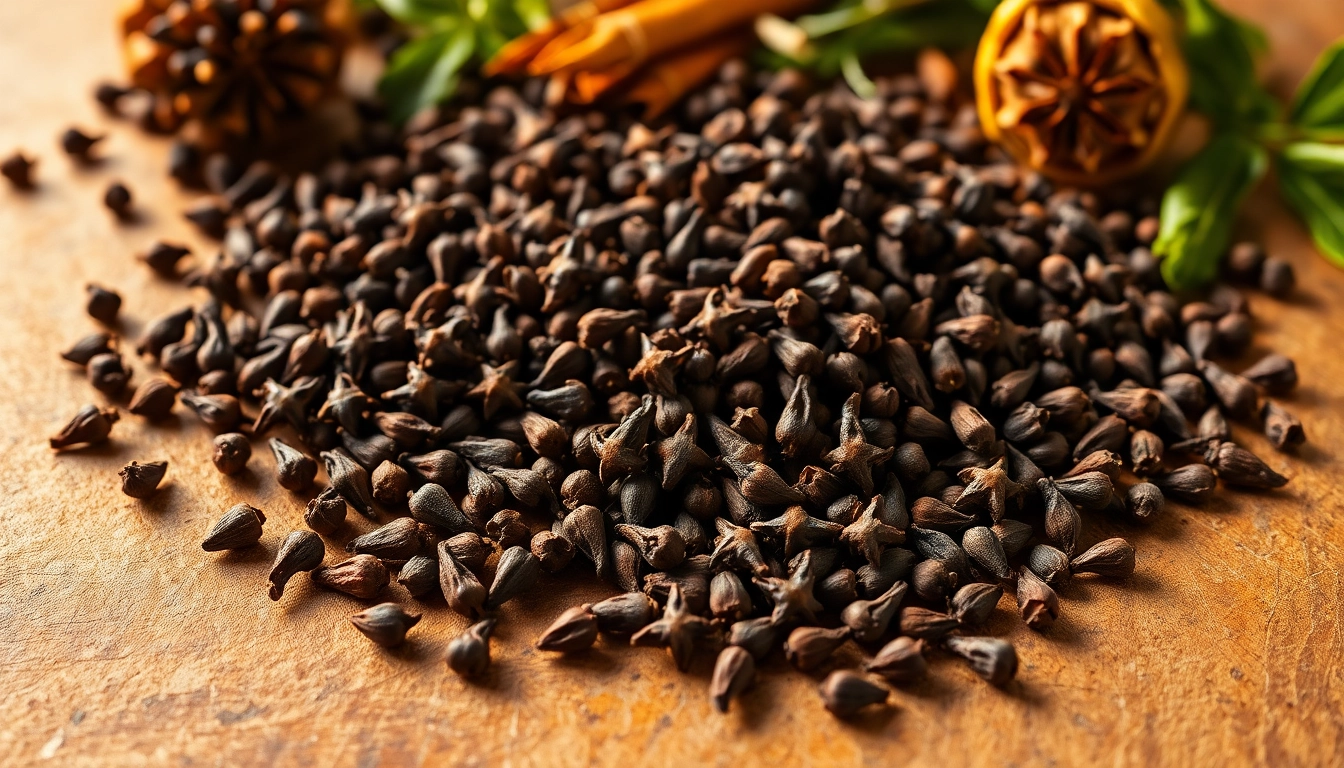Understanding Cloves: Origins and Characteristics
Cloves, known scientifically as Syzygium aromaticum, are the dried flower buds harvested from a tropical evergreen tree that belongs to the Myrtaceae family. These aromatic buds are native to the Maluku Islands, also referred to as the Spice Islands, located in Indonesia. Their rich, potent flavor and unique fragrance make them a staple in global cuisines and various products. For those seeking to explore the aromatic realm of spices, cloves offer an exquisite journey through taste and history.
The History of Cloves
The significance of cloves dates back thousands of years. They were highly valued in ancient times, used not only as a culinary spice but also for their medicinal properties. Historical records indicate that cloves were traded as early as the 3rd century BC. They found their way to the Middle East and Europe through trade routes, impacting culinary practices and medicinal uses across cultures. The spice gained immense popularity during the spice trade era, leading to colonial explorations driven by the desire to control the clove trade in the 16th and 17th centuries.
Physical Characteristics of Cloves
Cloves are characterized by their small, reddish-brown, and dried flower buds that resemble miniature nails. They are typically harvested when they are still unopened and then dried in the sun. As they dry, they develop the strong, pungent flavor and aromatic oils that they are famous for. Each clove is about 1-2 centimeters long, with four protruding petals that open to reveal the immature flower. The potent aroma comes from eugenol, the main chemical compound in cloves, contributing to their distinctive warm and sweet profile.
Types of Cloves and Their Uses
There are primarily two types of cloves harvested commercially: Maluku (or Indonesian) cloves and Ceylon (or Sri Lankan) cloves. Indonesian cloves are larger and have a stronger flavor, making them favorable in spice blends and culinary dishes. On the other hand, Ceylon cloves have a more delicate taste and are predominantly used in baking and sweet dishes. Each type possesses unique attributes suited for particular culinary applications, making them versatile in use.
The Nutritional Profile of Cloves
Cloves are not just flavorful; they are also packed with essential nutrients that contribute to their health benefits. They are a rich source of vitamins, minerals, and antioxidants, making them a valuable addition to a healthy diet.
Essential Nutrients Found in Cloves
In a typical serving of cloves, one can find a variety of essential nutrients, including vitamin C, vitamin K, potassium, and manganese. Manganese, in particular, is significant for various bodily functions including metabolism regulation and bone health. This small spice packs a nutritional punch, highlighting why it has endured through centuries as a valuable commodity.
Antioxidants and Their Health Benefits
Cloves are known for their high antioxidant content. Compounds like eugenol not only provide flavor but also combat oxidative stress in the body. Antioxidants play a crucial role in fighting free radicals, which can lead to chronic diseases, including cancer and heart disease. Incorporating cloves into daily diets can thus contribute to overall health maintenance, promoting cellular health by protecting against oxidative damage.
Manganese and Metabolic Support
Manganese found in cloves aids in the regulation of metabolism and helps the body utilize carbohydrates and proteins effectively. This mineral also supports bone formation and maintenance. A diet rich in manganese can promote healthy bone density while also mitigating risks associated with metabolic disorders, making cloves an excellent dietary inclusion for holistic health.
Health Benefits of Cloves
Cloves have long been revered for their multitude of health benefits, emanating from their rich nutrient and antioxidant profile. Understanding these benefits allows for a more informed approach to their culinary uses.
Cloves and Digestive Health
One of the most prominent health benefits of cloves relates to digestive health. They have been traditionally used in herbal medicine to alleviate digestive issues, including bloating, gas, and indigestion. Cloves help stimulate the secretion of digestive enzymes, enhancing the overall digestive process. For individuals facing digestive discomfort, incorporating cloves into teas or meals can provide a soothing effect.
Cloves in Pain Relief: A Natural Solution
Cloves possess natural analgesic properties owing to eugenol, a compound prevalent in their essential oil. They are often used in alternative medicine to ease dental pain and headaches. Clove oil is commonly applied topically for pain relief, showcasing its widespread applications. It can also support inflammation reduction, making it beneficial for individuals dealing with chronic pain conditions.
Potential Antimicrobial Properties of Cloves
The antimicrobial properties of cloves have gained attention in research, indicating that they might inhibit the growth of certain bacteria and fungi. This makes cloves a potential ally in promoting oral health and combating infections. Incorporating cloves in cooking or consuming them in health teas can contribute beneficially to one’s health regimen, particularly for those looking to enhance their immune response.
Cooking with Cloves: Culinary Applications
Cloves are an essential spice in various cuisines around the world. Their unique flavor profile makes them versatile for numerous culinary applications, enhancing both sweet and savory dishes.
Traditional Dishes Featuring Cloves
Across different cultures, cloves are integrated into traditional dishes that celebrate their bold flavor. In Indian cuisine, they are a key component of garam masala, enriching the flavors of curries and stews. Middle Eastern cuisine often utilizes cloves in rice dishes, lamb, and tagines, imparting depth and richness. In Western applications, cloves are popularly included in spiced cakes and holiday dishes, exemplifying their versatility.
Cloves in Baking: Enhancing Flavor
Cloves are a common ingredient in baking, especially during the festive season. They pair wonderfully with other spices like cinnamon and nutmeg, making them a staple in recipes for gingerbread, pumpkin pie, and spiced cookies. Their warm flavor profile elevates baked goods, creating aromatic experiences that evoke memories of the holiday season.
Creative Ways to Incorporate Cloves in Daily Cooking
Incorporating cloves into daily cooking can be both creative and rewarding. They can be infused in broths and sauces for added depth or steeped in tea for a warming beverage. Cloves can also find their way into marinades, enhancing the flavor profile of meats and vegetables. For a unique twist, experiment with clove-infused oil for salad dressings or drizzle over roasted vegetables.
The Future of Cloves: Sustainability and Industry Trends
The global demand for cloves continues to rise, leading to a greater emphasis on sustainable farming practices and innovative product applications. Understanding these trends is essential for consumers and industry stakeholders alike.
Organic Clove Farming Practices
As the market trends lean towards organic products, many farmers are adopting organic clove cultivation practices. This shift not only supports environmental sustainability but also enhances the quality of the yield. Organic cloves are often considered superior in flavor and aroma, appealing to health-conscious consumers who seek natural products free from pesticides and chemicals.
Market Demand for Cloves and Related Products
The market for cloves extends beyond culinary applications; they are also integral in the formulation of essential oils, cosmetics, and herbal medicine. Increased awareness of their health benefits and culinary versatility has led to a growing consumer base seeking innovative clove-based products. As demand rises, the industry is witnessing new entries focusing on ethical sourcing and sustainability.
Innovations in Clove-Based Products
Innovations in clove products have surged, with companies exploring ways to extract and harness the benefits of cloves more effectively. This includes the development of clove supplements, tinctures, and concentrated extracts that make it easier for consumers to incorporate cloves into their health regimens. Additionally, the cosmetic industry is utilizing clove oil for its antimicrobial properties, developing natural skincare products that capitalize on the spice’s benefits.



